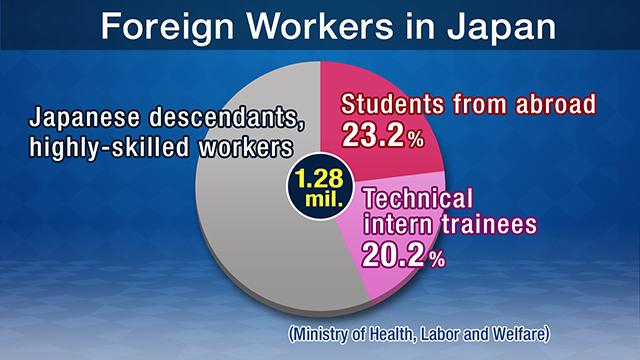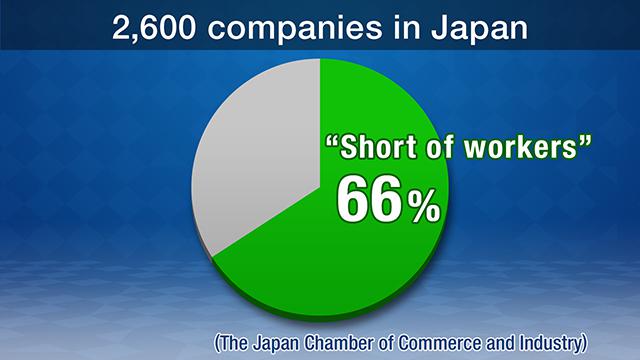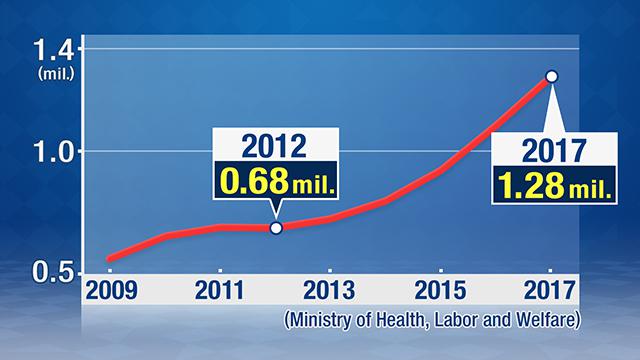The number of foreign workers in Japan has doubled in just 5 years between 2012 and 2017. Many of them are students working part-time and foreign trainees looking to acquire technical skills.

The trainees are meant to return to their homeland to utilize their new skills, thereby contributing internationally. But a serious labor shortage in Japan has caused them to become an important part of the country's workforce. One in every 50 workers in Japan is now a foreigner.
Policy shift
Japan's initial policy was to accept mostly highly-skilled foreign workers, such as doctors and researchers. But that has now become a mere facade. The government decided to review the policy to increase the number of foreign workers.
Japanese officials are now planning to create a new visa status for foreign workers. There are roughly 2 ways to obtain it. One is to pass technical skill exams written up by industry groups. An applicant would also need to be proficient enough in the Japanese language to be able to communicate relatively smoothly in daily conversations. The rules are less stringent than before. Applicants will be allowed to work in Japan for up to 5 years if they meet the new requirements.
Another way to obtain the status is to complete the technical internship program. Under previous rules, those who completed the program had to return to their homeland after working in Japan for up to 5 years. But they'll be able to extend their stay by another 5 years, meaning they can work in Japan for a maximum of 10 years.
Serious labor shortage
Behind the change is a serious shortage of workers. A survey by the Japan Chamber of Commerce and Industry found two-thirds of 2,600 companies it polled said they don't have enough workers.

And the number has increased for 4 consecutive years. Under the conventional system, calls had been growing for new measures to attract more foreign workers to Japan. Businesses wanted foreign trainees who had acquired the skills to do a job to stay in Japan longer.
Meanwhile, the government is stressing that the proposed changes do not mean it's introducing a new immigration policy. Officials maintain that foreign workers will not become a permanent part of Japan's workforce. They say the workers will not be allowed to bring their family members to Japan, and that the industries accepting them will be limited. The new visa will be issued only to those planning to work in industries that are especially hard-hit by labor shortages, such as farming, nursing care, construction, hotels and ship building.

Working population decline becoming a structural problem
As Japan grapples with a lower birthrate and an aging population, the labor shortage is feared to become a structural problem rather than a temporary one caused by economic ups and downs.
The government plans to check how serious the shortage is, not only in the sectors that were previously mentioned, but also in others such as the retailing and auto industries. Based on their findings, officials will consider adding more industries to the list of candidates that can accept foreign workers.
Discussion on accepting more workers from overseas is unavoidable.
Race to acquire foreign workers intensifying
A major concern is whether foreigners will choose to work in Japan even under the new system.
One reason is wage hikes in Asia. In countries such as Thailand and Vietnam, basic wages have risen in recent years. Rapid economic growth has led to a jump in minimum wages and better working conditions.
Secondly, some countries are ahead of Japan in taking measures to accept more foreign workers. South Korea introduced its Employment Permit System in 2004 to hire a wide range of foreign workers. It also offers them advice and counseling. These measures have produced positive results.
Another potential rival is China. The country is graying rapidly. It is expected that more than 14 percent of the country's total population will be 65 years or older by the year 2025.
Japan will not be the only country to lack manpower, especially in fields like nursing care and agriculture. International competition to acquire workers is expected to intensify in the years to come.
A need to improve working and living environments of foreign workers
Under Japan's proposed new system, foreigners will be allowed to work in the country for up to a decade. But they will not be allowed to bring their families with them, and there are concerns they will face problems adjusting to their new environments.

There is a growing need for Japan to provide better working and living environments for incoming workers, as well as programs to help them improve communicating in Japanese. It is also important for communities to accept non-Japanese residents and bond with them. Japan will need to make itself a more attractive place to work.
Long-term vision needed
Discussions on accepting workers from overseas should be carried out from a long-term perspective.
Some people severely criticize the government's proposal. They say it must review the work environment of its own people before considering accepting foreign workers, and that it should fundamentally reform the labor market to make it easier for the elderly and women to work.
They also say the government appears to be taking temporary measures to deal with the labor shortage and is lacking long-term vision. They worry about businesses relying on foreigners on the back of tighter regulations on domestic temporary workers -- and avoiding drastic reforms.
An in-depth discussion on how to set up a system which will be beneficial both for incoming workers and for Japanese nationals is desperately needed.
